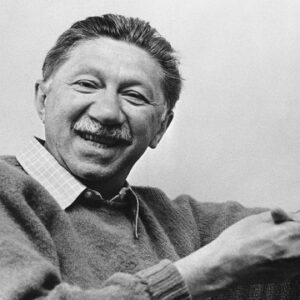Abraham Maslow was a well-known psychologist whose Maslow’s Need Hierarchy hypothesis is considered his most important contribution to psychology. He thought that all humans strive for happiness in life by meeting certain demands. He had a very terrible and unhappy childhood and had to overcome many obstacles as he grew older. His sensitivity was often portrayed in his works as a result of his challenging childhood experiences. Despite having an insensitive and nasty mother who never loved him and an apathetic father who often belittled him, the boy grew up to be a loving spirit who concentrated on the positive qualities in people no matter what. His original professional decision, partly motivated by his desire to impress his father, was to become a lawyer. However, legal studies were not for him, and he soon switched to psychology. The prominent psychologists Alfred Adler, Max Wertheimer, and anthropologist Ruth Benedict served as mentors to him, and they had a profound influence on his thought. Maslow established a positivist attitude and became the founder of the humanistic psychology school. The hierarchy of needs, self-actualization, and peak experiences were three of his primary theories that had a huge impact on humanistic psychology.
Childhood and Adolescence
In New York, he was born as the eldest of seven children to Samuel and Rose Maslow. His parents were Russian Jewish immigrants.
He grew up in a multicultural neighborhood. His family was impoverished, and his parents were callous and unkind. His father verbally abused and humiliated him to the point where he felt unworthy. His mother was a greedy, heartless woman who never loved or cared for her children.
Because he was the only Jewish youngster in his neighborhood, he was subjected to anti-Semitism and was bullied by other boys due to his faith.
His life’s challenges prompted him to seek sanctuary in the library, where he discovered his passion for reading.
He went to Boys High School and was a member of a number of academic clubs. For a year, he also served as the editor of the Latin Magazine and the school’s Physics publication.
He enrolled in City College of New York and began taking evening legal studies. He quickly recognized that law school was not for him and dropped out.
Later, he studied psychology at the University of Wisconsin. Experimental-behaviorism was his subject of research there. Because of his encounter with behaviorism, he formed a strong positivist attitude. In 1931, he earned his master’s degree in psychology.
Career of Abraham Maslow
In 1937, he joined the faculty of Brooklyn College, where he remained until 1951.
Maslow was too old to enroll and ineligible for the military when the United States entered World War II in 1941. The horrors of war, on the other hand, created a vision of peace in him, influencing his psychological concepts and assisting in the development of humanistic psychology.
His two mentors, psychologist Max Wertheimer and anthropologist Ruth Benedict, had a profound influence on him, and their behavior served as the foundation for his studies on mental health and human potential.
In his 1943 publication ‘A Hypothesis of Human Motivation’ in ‘Psychological Review,’ he proposed a needs hierarchy theory. In his 1954 book, ‘Motivation and Personality,’ he detailed this hypothesis.
He believed that in order to reach self-actualization, humans have a set of wants that must be met in a hierarchical sequence. Physiological, Safety, Belongingness, and Love needs, as well as Esteem, Self-Actualization, and Self-Transcendence needs, according to him.
He thought, as a humanistic psychologist, that everyone has a strong desire to develop their full potential and achieve self-actualization. He came up with this hypothesis after examining people like Albert Einstein, Henry David Thoreau, Ruth Benedict, and others who he thought had achieved self-actualization.
In 1951, he was employed as a professor at Brandeis University. He taught there until 1969, when he moved to California to work as a resident fellow at the Laughlin Institute.
In 1961, Maslow and Tony Sutich established the ‘Journal of Humanistic Psychology.’ The journal is still publishing academic papers today.
Major Projects of Abraham Maslow
Maslow’s Needs Hierarchy Theory, which he first articulated in 1943, is his greatest contribution to psychology. In domains such as sociology, management, psychology, and psychiatry, the hierarchy is a widely used paradigm in research and education.
Personal History and Legacy
He married Bertha, his first cousin, while he was only 20 years old, in 1928. His marriage was the start of a wonderful family life for him. They had two daughters together and enjoyed a happy marriage that lasted till his death.
He had a history of heart issues, and in 1967 he had a massive heart attack. In 1970, he suffered another heart attack and died three years later.
The Abraham Maslow Prize is given by the American Psychological Association to persons who have made a significant and lasting contribution to the study of the human spirit.
Estimated Net Worth
Abraham is one of the richest Psychologist & listed on most popular Psychologist. According to our analysis, Wikipedia, Forbes & Business Insider, Abraham Maslow net worth is approximately $1.5 Million.
Trivia
He was a harsh critic of Sigmund Freud, a well-known psychologist.
Alfred Adler, a psychotherapist, was once his mentor.


